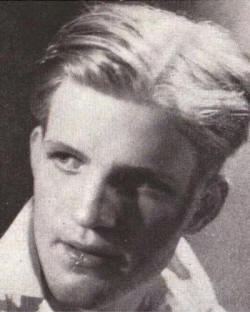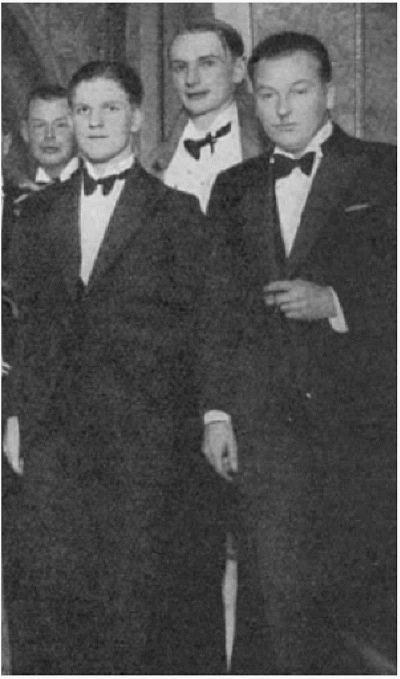 Richard William John Nugent Rumbold (June 24, 1913 - March 10, 1961)
was an author and journalist.
Richard William John Nugent Rumbold (June 24, 1913 - March 10, 1961)
was an author and journalist.Queer Places:
University of Oxford, Oxford, Oxfordshire OX1 3PA
Flat 10, 155 Sloane St, London SW1X 9AB, UK
Ss Mary and Andrew Churchyard
Watton-at-Stone, East Hertfordshire District, Hertfordshire, England
 Richard William John Nugent Rumbold (June 24, 1913 - March 10, 1961)
was an author and journalist.
Richard William John Nugent Rumbold (June 24, 1913 - March 10, 1961)
was an author and journalist.
Richard William John Nugent Rumbold was born on 24 June 1913, the second of the three children of Charles Edmund Arden Law Rumbold (1872–1943), an army officer, and Anne Christian Nugent (1881–1928). There was an elder brother who died at birth and he had a sister, Rosemary, three years younger, who pre-deceased him.
He fought in the Second World War. He gained the rank of Pilot Officer in the Royal Air Force. In 1949, using the pseudonym Richard Lumford, the former wartime RAF pilot wrote an autobiography called My Father’s Son in which he eloquently expressed the difficulties he faced in adapting to civilian life. Richard was a complex man who, as a young adult, had suffered from tuberculosis and a chronic and only partially curable neurosis. Richard Rumbold had a troubled childhood, with a bully for a father, and a mother who suffered from depression and committed suicide. Raleigh Trevelyan described him in the Oxford Dictionary of National Biography (2004) as ‘handsome and physically well built, with blue eyes’ but noted that Richard’s father constantly attacked him for being effeminate.
William Plomer writes of Richard as someone who, when he was well and in good spirits, ‘appeared genial and good-humoured, but a deep seriousness persisted. He had had little stimulus, in his early and formative years, to lightheartedness. As he grew up he was aware of his sadness, and he seriously and pathetically recorded a resolution, when only twenty, to make more jokes.’


Richard Rumbold in front ( left) with Richard Aldington
In 1933, while he was a student at Christ Church, Oxford, Richard ran a literary club, arranging talks by such luminaries as Oscar Wilde’s lover, Lord Alfred Douglas, and W. B. Yeats. However, when he was just 20, Richard became a cause célèbre when he published a novel, Little Victims. The book hit hard at the Catholic Church, his parents, public-school homosexuality, and Oxford aesthetes. As a result he was refused the sacrament by the university chaplain, Father Ronald Knox. Richard was diagnosed with tuberculosis and left Oxford without taking a degree in 1934. He travelled a great deal and on a cruise met a well-off American, Hilda Byrne Young, who for much of his life acted as a doting substitute mother.
At the outbreak of war, Richard was keen to do his bit, and he joined up as a private in the Royal Army Service Corps (RASC). This angered his father, who had served as a regular officer in a cavalry regiment – the Queen’s Bays – in the South African War nearly 40 years earlier. Captain Rumbold was incensed that his only son had joined the ranks. Not only did the Captain write abusive and contemptuous letters to his son but he interfered, by informing the Army that Richard had TB. Consequently the young man was forced to leave. However, Richard was not deterred. Richard received his certificate of discharge on 3 March 1943 but it stated that he was discharged for being ‘physically unfit’ and that ‘this airman has carried out his duties in a conscientious and entirely satisfactory manner’. After leaving the RAF, Richard’s TB flared up and he was forced to spend a few months in a sanatorium. He then found employment as a war reporter, which enabled him to make several flights with his beloved RAF, including a bomber raid on Ulm in southern Germany.
He began treatment for schizophrenia and edited a collection of Flaubert's letters in 1950. He took up riding a motorcycle, at tremendous speeds. His ecstatic discovery of flying led to a biography of Saint-Exupéry, ‘The Winged Life’ (1953), written in collaboration with Lady Margaret Stewart. Hilda Young accompanied Richard to Ceylon, where he hoped to find 'sensual liberation and spiritual reconciliation'. His interest in Buddhism took him to Japan, where he was a part-time postulant in a Zen monastery.
In the 1960s Rumbold went to Sicily, accompanied by Hilda Young. On 10 March 1961, at a hotel in Palermo, while Hilda Young was typing in another room, Rumbold fell from a window, possibly accidentally, and died.
Richard Rumbold is buried in the graveyard of the Anglican Church of Watton-on-Stone in Hertfordshire. “ [An] idealist, ceaselessly searching for a faith for his idealism, and for inner peace'. Extracts from his diaries, with some meditations on Zen, were edited and published by his cousin, the poet, William Plomer in ‘ A Message in Code’ (1964).
Anecdotes about Richard Rumbold feature in the books of several literary figures including Harold Nicolson, Cecil Roberts, James Lees-Milne and Robin Bryans. Evan Morgan’s biographer William Cross has a chapter on Rumbold and his overlaps with Evan Morgan in the book “ Not Behind Lace Curtains, The Hidden World of Evan, Viscount Tredegar” ( 2013).
My published books: